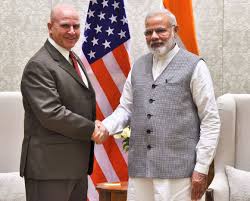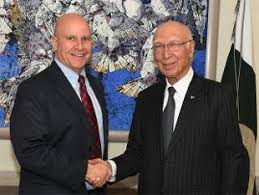The recent visit of the newly appointed US National Security Adviser, General McMaster, to South Asia was the first high-level visit by a senior figure in the Trump administration to the region. The Trump administration’s regional priorities has been reflected in the pattern of high-level visits in recent weeks: Vice President Pence has visited South Korea, Japan, Indonesia and Australia; US Defence Secretary, having visited Japan and South Korea, is currently visiting Saudi Arabia, Qatar, Israel, Egypt and Djibouti whilst Secretary of State Rex W. Tillerson, having visited Japan, South Korea and China, went on to visit Western Europe and Russia.

These high-level visits are not only significant for the new US administration to make ‘spot’ assessments, but also for indications of its emerging policies towards the regions concerned; thus, they also give a specific direction to the turn of unfolding events. For the same reasons, the US NSA’s visit evoked considerable interest amongst observers, both regional and international. As the pattern of visits has shown, the new administration’s interest is intensively focused on North Korean, with the US and the Chinese presidents being personally involved, the US NSA also issued a stark warning to North Korea during his stay in Kabul. Yet, the pace is picking up in Southwest Asia also as evident in the use, on the eve of his visit, of the most destructive non-nuclear bomb in the US armoury against the ISIS group in Afghanistan – a faction of the TTP (Tehrik-e-Taliban Pakistan) called ‘Wilayet-e-Khorasan’; the ‘direct’ impact of this bombing has been of the reported killing of 13 Indians, out of a total of 21, who had surreptitiously gone to Afghanistan from Kerala.
This inter-agency delegation, led by General McMaster, included the new National Security Council Director for South Asia, Lisa Curtis, who has recently co-authored a policy recommendation paper by the Hudson Institute, Washington, advocating punitive action against Pakistan, including declaration of individuals – or, even, Pakistan itself as extreme measure – as sponsors of terrorism for lack of cooperation for supporting the Taliban who have shown no inclination to enter into peace negotiations with Afghan government.
Unravelling Afghan conundrum
There has been some speculation in the US media that the NSA’s visit to the region was planned at short notice. The US declined a Russian invitation to regional consultations on Afghanistan on April 14, which were attended by senior representatives from India, Afghanistan, China, Iran, Kazakhstan, Kyrgyzstan, Pakistan, Russia, Tajikistan, Turkmenistan and Uzbekistan: US considered these to be “a unilateral Russian attempt to assert influence in the region that (it) felt wasn’t constructive at this time”. On the same date, a trilateral meeting at the level of foreign ministers between Russia, Syria and Iran took place in Moscow in which they condemned the US missile attacks on the Syrian air field as “a gross violation of international law”. In contrast with cooperation between the two countries at the time of the installation of the Karzai government, their strategic interests are divergent, reflecting their ‘global’ contestation, in the Af-Pak region where new alignments are emerging with Pakistan, Iran and, even, China coming closer to Russia.
Russia has rejected the US’ accusations of weapon supplies to the Taliban. There is also deepening distrust between the Afghan leadership and Russia over the latter’s overtures to the Taliban. At the same time, the current US commander in Afghanistan, General Nicholson, describing the current military situation in Afghanistan as stalemate in his Congressional testimony, has asked for several thousand more troops to bolster the Operation Resolute Support for its mandated task of providing training to the 300,000-strong Afghan army and to carry out operations against the Al Qaeda and the ISIS. During his discussions with the Afghan President, the latter put the blame squarely on Pakistan. General McMaster, in an interview to a local TV channel, stated that those who refused to talk to Afghanistan government need to be defeated on the “battlefield”. Referring specifically to Pakistan, he stated that it is “in their interest to go after these groups less selectively than they have done in the past… Best way to pursue their interests in Afghanistan and elsewhere is through use of diplomacy” (emphasis added). According to Pakistan’s ‘Dawn’ newspaper, McMaster also said in that interview that those perpetuating violence in Afghanistan “ought to be exposed and held accountable”.
Stern message to Pakistan
From Kabul, he travelled to Islamabad for meetings with the leadership, including Prime Minister, the Army Chief, the Pakistani NSA and others. The US embassy, in its statement, stated that the US NSA stressed “the need to confront terrorism in all its forms” – which the Pakistani military spokesperson, immediately, dismissed as “political rhetoric”. According to the Pakistani official statements, Prime Minister Nawaz Sharif expressed readiness to work with the international community to explore ways to resolve the Afghan crisis. He also talked about the Kashmir issue, while referring to the US President’s reported willingness to help India and Pakistan to resolve their differences, particularly in Jammu and Kashmir.

Following the meeting between him and the Army Chief, the Pakistan military’s press release, in an apparent reference to his Kabul interview, stated, “Pakistan itself a victim of state sponsored terrorism, strongly rejects allegations of employing proxies from its soil. US NSA acknowledged Pakistan Army’s efforts in eliminating terrorism and infrastructure, assuring US support to bring peace and stability in the region and globally.” The Pakistan Army’s officially released video clip of the meeting shows a tense atmosphere at this meeting.
The shifting geopolitics in Southwest Asia could be behind the terse public messaging on the part of the Pakistan military. It could also be their calculation that an increased number of US troops in Afghanistan would imply greater US dependence on the supply routes via Pakistan; the tense relations with Russia might also mean increased difficulty in using the alternate northern supply route. The use of the largest non-nuclear bomb in the adjacent Nangarhar province against the ‘Wilayet-e-Khorasan’ terrorists was a signal not just to Russia but also to Pakistan because of their hostility to the latter. The Congressional requests for funding for Pakistan by the present administration have not shown any reduction from the previous years although the president has the authority to withhold funding if Pakistan does not cooperate in cracking down on terrorists inimical to US operations in Afghanistan.
India agenda
In New Delhi, General McMaster’s meeting with Prime Minister Narendra Modi was preceded by extensive delegation-level discussions with his Indian counterpart. The Prime Minister’s office stated that the two sides discussed how to effectively address the challenge of terrorism and to advance regional peace, security and stability, the regional scope of which covered Afghanistan, West Asia and North Korea. The US embassy’s press release stated that the bilateral talks “emphasise the importance of US-India strategic relationship and reaffirmed India’s designation as a major defence partner.”
The new US administration’s approach, from the public messaging point of view, shows a new determination to get to the brass tacks and the anxiety in Islamabad is palpable. Whilst ‘spot’ assessment has been done by the new NSA with considerable personal military experience in Afghanistan, there are fresh strategic alignments in the region and Islamabad still feels that it has some cards to play. As Afghanistan faces security uncertainty, including periodic exchange of artillery shells between the Afghan and Pakistani armies, and political fragility with presidential elections due in two years’ time, the question still remains as to how much deeper the new US administration intends to get involved there as it thinks through its global priorities. And, this is where the anxieties of the Indian leadership lie.
(Yogendra Kumar is the author of Diplomatic Dimension of Maritime Challenges for India in the 21st Century. A former diplomat, he had served as Ambassador of India to the Philippines and held important postings in key capitals. The views expressed in this column are solely those of the author)
Author Profile
- India Writes Network (www.indiawrites.org) is an emerging think tank and a media-publishing company focused on international affairs & the India Story. Centre for Global India Insights is the research arm of India Writes Network. To subscribe to India and the World, write to editor@indiawrites.org. A venture of TGII Media Private Limited, a leading media, publishing and consultancy company, IWN has carved a niche for balanced and exhaustive reporting and analysis of international affairs. Eminent personalities, politicians, diplomats, authors, strategy gurus and news-makers have contributed to India Writes Network, as also “India and the World,” a magazine focused on global affairs.
Latest entries
 In ConversationJuly 26, 2024India-Italy defence collaboration can extend to third countries: Anil Wadhwa
In ConversationJuly 26, 2024India-Italy defence collaboration can extend to third countries: Anil Wadhwa In ConversationJuly 23, 2024Italy views India as a key partner in Indo-Pacific: Vani Rao
In ConversationJuly 23, 2024Italy views India as a key partner in Indo-Pacific: Vani Rao DiplomacyJune 29, 2024First BRICS unveils a roadmap for boosting tourism among emerging economies
DiplomacyJune 29, 2024First BRICS unveils a roadmap for boosting tourism among emerging economies India and the WorldJune 11, 2024On Day 1, Jaishankar focuses on resolving standoff with China
India and the WorldJune 11, 2024On Day 1, Jaishankar focuses on resolving standoff with China






